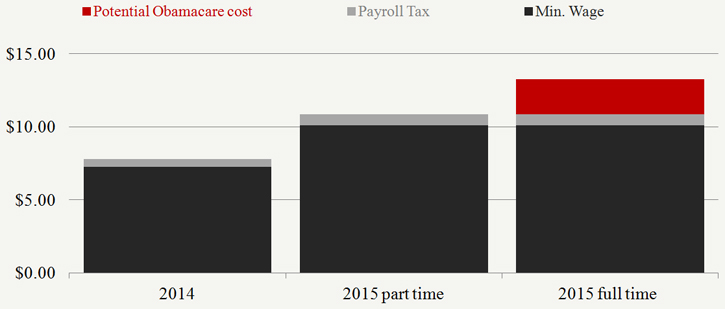Democrats’ One-Two Economic Punch
More than four years into the economic recovery, the unemployment rate remains near levels previously seen only during recessions. Despite this, the Obama Administration and Senate Democrats are pushing for an increase in the federal minimum wage that the non-partisan Congressional Budget Office says will lead to further job loss.
CBO Estimates the Effect of a $10.10/hour Minimum Wage

Source: CBO
Bad Time to Increase the Minimum Wage
Weak jobs reports suggest momentum needed to boost our economy has slowed, along with enthusiasm about an economic upturn this year. Four and a half years after the great recession ended, there are still four million fewer full-time jobs than there were before the recession.
In his recent State of the Union address, President Obama called on Congress to raise the federal minimum wage from $7.25 to $10.10 an hour. Senator Harkin and 31 Democratic cosponsors have introduced legislation (S. 1737) to raise the federal minimum wage to $10.10 an hour over two and a half years, and index it to inflation thereafter.
According to CBO, the Democrats’ proposal to increase the federal minimum wage to $10.10 an hour would reduce total employment by about 500,000 workers, or 0.3 percent. At the high end of their estimate, it could lead to “a reduction in employment of 1.0 million workers.”
There are approximately 16.5 million workers who currently earn up to $10.10 an hour who could be affected by the legislation. Increased earnings would not “only go to low-income families, because many low-wage workers are not members of low-income families.” In fact, just 19 percent would go to families with earnings below the poverty threshold, while 29 percent would go to families earning more than three times the poverty level. The increased earnings for some workers would be accompanied by reduced income for those who become jobless as a result of the higher minimum wage. Business owners, consumers, and taxpayers would face higher prices.
Across the economy, workers with increased earnings would pay more in taxes and receive less in certain federal benefits. Conversely, those who become unemployed because of the increase would pay less in taxes and receive more in government benefits. CBO concludes this combined effect of raising the minimum wage would probably be a small decrease in federal budget deficits in the short term, but an increase in deficits in the years thereafter.
CBO notes that the percentage reduction in employment of low-wage workers is generally greater in the long term, as employers replace low-wage workers with more productive, higher-wage workers or equipment. Another alternative for employers seeking to offset higher wages for minimum wage workers is to reduce training. This is particularly harmful for low-wage, entry-level workers who learn important jobs skills in these positions. Research shows that the vast majority of minimum wage workers earn a pay increase within 12 months on the job. Increasing the minimum wage could remove this important first step on the ladder for many.
Earlier this month, President Obama unilaterally raised the minimum wage to $10.10 an hour starting January 1, 2015, for workers on federal contracts. His executive order also extends this minimum wage to tipped employees and workers with disabilities. Though the executive order changes will affect fewer workers, the impact will be felt earlier than any legislative change.
Impact Multiplied by Obamacare
CBO notes that the situation for low-wage workers may be even worse when you consider the new costs being imposed on employers at the same time by Obamacare. It anticipates the cost of complying with the Affordable Care Act mandate will ultimately be borne by low-wage workers through lower wages.
In addition to the $2.85 an hour hike in the minimum wage, Obamacare fines could mean a 70 percent increase in compensation costs for low-wage workers. In separate analysis, the CBO said earlier this month that Obamacare is expected to drive 2.5 million people out of the workforce by 2024. This is nearly triple the impact CBO previously estimated in 2010.
Compensation Costs Soar

Source: IBD
Next Article Previous Article
